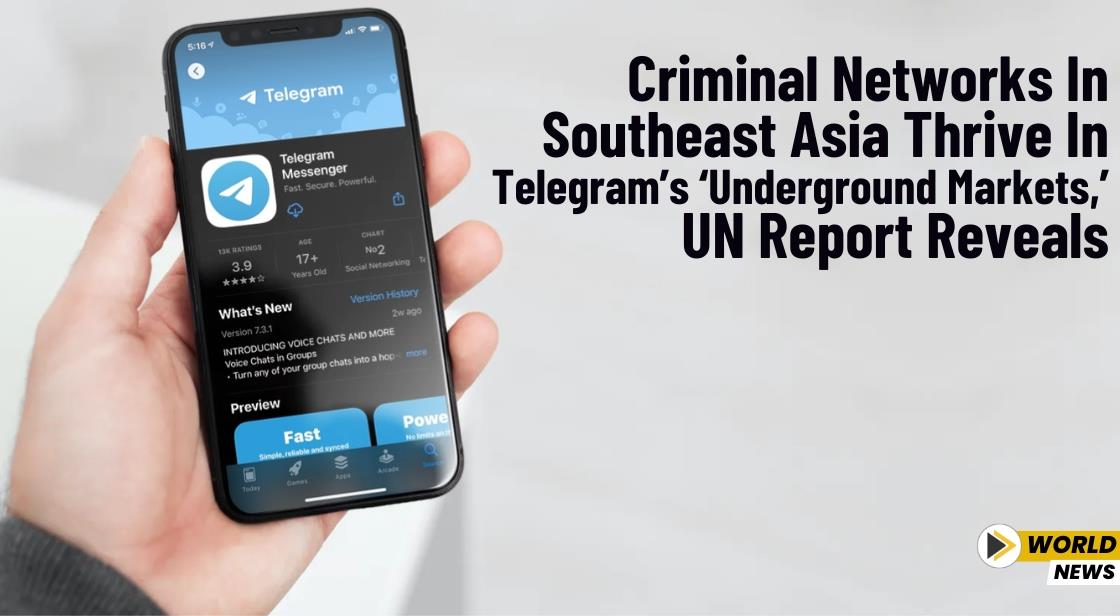Criminal Networks in Southeast Asia Thrive in Telegram’s ‘Underground Markets,’ UN Report Reveals

News Synopsis
According to a report released by the United Nations Office for Drugs and Crime (UNODC) on Monday, Southeast Asia has become a critical hub for large-scale criminal activity, with the messaging app Telegram playing a central role. Criminal networks operating in the region have increasingly turned to this encrypted platform to facilitate a range of illicit activities, fundamentally transforming the landscape of organized crime.
The app has emerged as a haven for illegal trade, from personal data and cybercrime tools to unlicensed cryptocurrency exchanges, posing significant threats to cybersecurity and international law enforcement efforts.
Telegram: A Hub for Illicit Transactions
The United Nations Office for Drugs and Crime (UNODC) report underscores how Telegram’s channels, often with little to no moderation, have enabled criminal groups to trade hacked data such as credit card details, passwords, and browser histories. In addition, deepfake software, malware, and other tools designed for cybercrime are sold openly.
One specific advertisement, written in Chinese, boasted of moving "3 million USDT stolen from overseas per day", highlighting the app’s role in facilitating cyber-enabled fraud.
Escalating Criminal Activity in Southeast Asia
The report emphasizes that criminal networks in Southeast Asia have moved to Telegram in search of anonymity and security, leveraging the app's encrypted messaging features to avoid detection. Southeast Asia has emerged as a critical region for multibillion-dollar fraudulent industries, many of which are operated by Chinese syndicates working from fortified compounds. The industry generates a staggering $27.4 billion to $36.5 billion annually, according to the UNODC report.
The Role of Telegram’s Leadership and Legal Challenges
The rise of Telegram as a platform for organized crime has drawn legal attention worldwide. Notably, Pavel Durov, the app’s founder, was arrested in Paris in August 2024 and charged with facilitating criminal activity on the platform, including the spread of sexual images of children. Durov's arrest has reignited debates surrounding the responsibilities of app providers in balancing freedom of speech and law enforcement.
Following his arrest, Durov, who is currently out on bail, announced that Telegram would begin cooperating with legal authorities, handing over users’ IP addresses and phone numbers when legally requested.
In response to mounting pressure, Durov also revealed that certain features of the app that had been exploited for illegal activities would be removed. However, these efforts have come under scrutiny as critics argue that more aggressive actions are needed to curb Telegram’s role in illegal operations.
Global Impact and International Investigations
The influence of Telegram’s underground markets extends beyond Southeast Asia. Law enforcement agencies worldwide, including South Korean police, have launched investigations into Telegram's role in online sex crimes. South Korea, a country notably targeted by deepfake pornography, has become a focal point in this international investigation.
Furthermore, a recent data leak from top Indian insurer Star Health by hackers on Telegram highlighted how criminals are using the platform to access and distribute sensitive personal data. According to a report, chatbots on Telegram were used to expose policy and claims documents containing names, addresses, tax details, and medical records.
Innovations in Organized Crime
In its report, the UNODC stated that criminal groups have innovated their operations by integrating cutting-edge technologies like malware, generative artificial intelligence, and deepfake software into their schemes. The report identified more than 10 deepfake software providers actively marketing their services to criminal organizations involved in cyber-enabled fraud in Southeast Asia.
Benedikt Hofmann, UNODC’s deputy representative for Southeast Asia and the Pacific, described Telegram as an easily navigable platform for criminals, making it riskier for consumers as their data could be fed into scams or other forms of criminal activity.
Conclusion
The United Nations Office for Drugs and Crime (UNODC) report highlights the growing concerns around Telegram’s role in enabling organized criminal activities, particularly in Southeast Asia. As a preferred platform for these groups, Telegram has facilitated the exchange of sensitive data, cybercrime tools, and even cryptocurrency transactions, largely due to its encryption and lack of moderation.
Despite recent efforts by the app’s leadership, including founder Pavel Durov’s arrest and his pledge to cooperate with law enforcement, criminal networks continue to exploit Telegram's features. The scale of these operations underscores the evolving nature of cybercrime and the challenges posed to global law enforcement agencies.
The report also emphasizes the need for stronger actions and tighter regulations to curb Telegram's misuse, especially as criminals integrate sophisticated technologies like malware and deepfakes. As investigations widen globally, this development could mark a turning point in the ongoing struggle between privacy in digital communication and the fight against organized crime.
The future impact of these measures will depend on how effectively law enforcement, tech platforms, and governments can collaborate to balance security and user privacy, while tackling illegal activities.
You May Like









